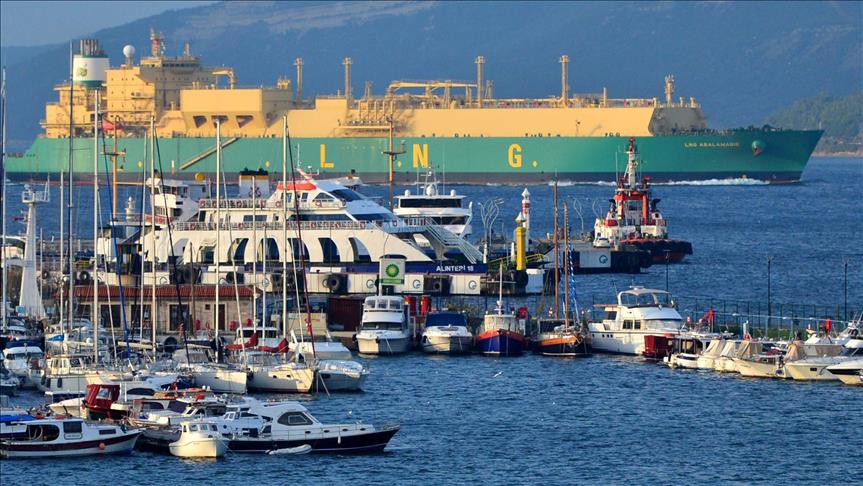Asian spot liquefied natural gas (LNG) prices reached record high levels this month due to lower inventories to meet increasing energy demand and structural problems in the Asian market.
Because of the lower stock to meet demand, many countries have been forced to use spot LNG cargoes, particularly Japan, which has had severe problems in obtaining sufficient energy supplies due to inadequate nuclear power and gas capacity.
Ashutosh Shastri, the founding director of EnerStrat Consulting, and a distinguished fellow of the US-based energy policy think tank, EPRINC, told Anadolu Agency that Japan, with its mature natural gas market and extensive LNG contracting history, is also now a market that is slowly experiencing an end to its historical legacy LNG contracts and beginning to secure some of its LNG on spot Japan Korea Marker (JKM) market pricing terms.
'The rapidly declining electricity reserve margins in Japan, which led to a fly-up in the day-ahead electricity prices, and this combined with exceptionally cold weather, exacerbated the problem. These were quickly reflected in the Japan Korea Market (JKM) price movements,' Shastri said.
'The quantum and rate of rise in JKM appears to have triggered an unusual fly-up in shipping charter rates, typically Atlantic shipping rates,' Shastri said.
Shipping charter rates increased by 250% largely driven by the arbitrage offered for Atlantic basin cargoes in the JKM.
Temperatures in Beijing and the wider Asia Pacific, which hit multi-decadal lows, were a contributing factor to inflated LNG prices.
However, Shastri said that 'while exceptionally cold weather is viewed as one of the factors driving high gas prices in Asia, the issue has a little more to it than meets the eye' and is even more complicated in Japan.
'Unlike Japan, the countries that have become recent users of LNG have tended to rely to a greater extent on relatively shorter-term contracts and the spot cargo trade,' Shastri said.
'The complicating factor in Japan has also been the rise in the day-ahead forward price of electricity-driven again partially by the weather but also by grid congestion and electricity market design-related issues. In Japan, therefore, the electricity market structural issues and the exceptionally cold weather contributed to the rise in prices. Japan also had relatively lower levels of inventory,' he said.
- Asian buyers to become more circumspect
Emin Emrah Danis, Gas & Power analyst, said that the spot price per million British thermal units (mmBtu) dropped down to $1.8 due to lower demand from the COVID-19 pandemic last year.
However, Danis said that a record rise was seen in January with increasing demand, extremely cold weather, lower stocks combined with insufficient nuclear capacity in Japan, and with the Asian spot LNG price increasing over 16 times to $32.5 per mmBtu.
Shastri said in southeast Asia, the price rise was particularly evident in China where the reopening of the economy led to an exceptional situation whereby several Chinese buyers triggered 'force majeure' clauses in their LNG contracts during the first half of 2020.
'This atypical weather pattern has brought into sharp focus the debate surrounding the gas and LNG sourcing portfolio balance between long-term contracts and dependence on spot cargoes. Asian gas buyers will become more circumspect about over-reliance on either option,' he said, noting that the sky-high spot LNG prices are not expected to remain at the same levels for March deliveries.
However, Shastri noted that given the longer-term implications from a possible coal-gas switch to meet net-zero targets and possible structural discontinuity emerging in international LNG shipping driven by carbon emission regulations for LNG carriers, there is a risk of these trends continuing over a longer period.
A growing number of countries have pledged climate neutrality to fight against the climate crisis.
'At the latest count, 126 countries, as per the International Energy Agency, have made policy statements for achieving net zero, among them Japan and South Korea figure prominently in Asia while China has made a commitment to climate neutrality by 2060. While the full implications of these policy statements are not likely to have affected the recent price spike in Asia, these are factors that are getting baked in the Asian gas pricing,' Shastri concluded.
By Nuran Erkul Kaya
Anadolu Agency
energy@aa.com.tr


